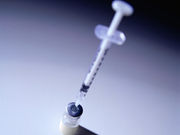Case report describes 41-year-old man with variceal rebleeding treated with terlipressin
FRIDAY, Nov. 20, 2015 (HealthDay News) — Terlipressin therapy can induce hyponatremia, according to a case report published online Nov. 17 in the Journal of Clinical Pharmacy and Therapeutics.
Y. Huang, M.D., from the Huazhong University of Science and Technology in Wuhan, China, and colleagues reported one case of stubborn hyponatremia induced by long-term (21-day) terlipressin therapy in a 41-year-old male.
The researchers describe the case of a man who was considered to have variceal rebleeding and who received the recommendation of endotherapy and surgery. He refused and received intensive internal treatment, including terlipressin for alleviating vasodilation of the splanchnic vascular bed. The patient’s serum sodium level decreased the second day after terlipressin initiation and continued decreasing. The drug was stopped on the 21st day of therapy; over the next three days the patient’s serum sodium concentration increased and urine volume returned to normal. In addition, symptoms of encephalopathy disappeared.
“Although terlipressin is an effective treatment for variceal bleeding with or without endotherapy, it may cause hyponatraemia or even encephalopathy,” the authors write. “Clinicians should be alert to this risk. Prospective studies of the optimum duration for terlipressin therapy are required.”
Copyright © 2015 HealthDay. All rights reserved.








